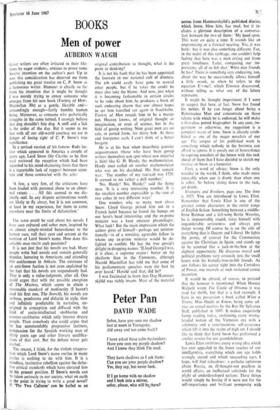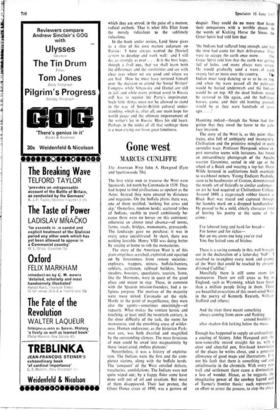Men of power BOOKS
AUBERON WAUGH
Great writers are often irritated in their life- times by eager students, anxious to prove some bizarre intention on the author's part. Up to now this consideration has deterred me from publishing my great treatise on C. P. Snow as a humorous writer. Humour is clearly so fa: from his intention that it might be thought I was merely trying to annoy someone who emerges from his new book (Variety of Men: Macmillan 30s) as a gentle, likeable and— astoundingly enough—fairly humble human being. Moreover, as someone who pathetically struggles in the same kennel, I strongly believe that dog shouldn't bite dog. A sniff and a lick is the order of the day. But it seems to me that with all our old-world courtesy we are in danger of losing sight of C. P. Snow's true significance.
In a revised version of his famous Rede lec- ture which appeared in America a couple of years ago, Lord Snow (Sir Charles as he then was) reviewed the reception which had been accorded to his mind-shattering thesis that there is a regrettable lack of rapport between scien- tists and those connected with the arts:
`A few, a very few, of the criticisms have been loaded with personal abuse to an abnor- mal extent. . . . All this seemed to me dis- tinctly odd. In any dispute acrimonious words are likely to fly about, but it is not common, at least in my experience, for them to come anywhere near the limits of defamation.'
The same could be said about his novels. I have seen cultured and sober men, inspired by an almost simple-minded benevolence to the human race, roll their eyes and scream at the mention of Lord Snow's name. How does this amiable man excite such passions?
It is not just that his novels are bad. Many people write bad novels and remain generally popular, lecturing to Americans and attending PEN conferences in Ankara. The existence of an anti-Snow faction is not even explained by the fact that his novels are stupendously bad. That is only a value-judgment, after all. One could argue that with the possible exception of The Masters, which seems to attain a reasonable standard of mediocrity (I haven't read his first one, The Search), his novels are verbose, ponderous and didactic in style, slow and infinitely predictable in narrative, un- original in conception and diffused with the kind of socio-intellectual snobberies and counter-snobberies which only interest dreary people. Then somebody else could argue that he has commendably progressive instincts, Compassion for the Spanish working man of thirty years ago and other literary qualifica- tions of that sort. But the debate never gets started.
The reason, I think, for the violent vitupera- tion which Lord Snow's name excites in many circles is nothing to do with him. It is a mindless, instinctive rebellion against the defec- tive critical standards which have elevated him to his present position. If Snow's novels can be taken seriously in our society, what on earth is the point in trying to write a good novel? If 'The Two Cultures' can be hailed as an original contribution to thought, what is the point in thinking?
It is not his fault that he has been appointed the laureate in our national cult of dimness. The job could easily have gone to several other people, but if he takes the credit he must also take the blame. And now, just when it is becoming fashionable in certain circles to be rude about him, he produces a book of such endearing charm that one almost hopes to see him laurelled yet again in Stockholm. Variety of Men reveals him to be a master not, Heaven knows, of original thought or imagination, or even of science, but in the field of gossip writing. Nine great men are on sale, in potted form, for thirty bob. At three and fourpence each, I can't think of a better bargain.
He is at his best when describing genuine acquaintances (those who have been gossip writers themselves can spot where new material is thin) like G. H. Hardy, the mathematician. Hardy once called on another mathematician who was on his deathbed. His first remark was: The number of my taxi-cab was 1729. It seemed to me rather a dull number.'
'No, Hardy! No, Hardy!' said the dying man. 'It is a very interesting number. It is the smallest number expressible as the sum of two cubes in two different ways.'
One wonders why so many men chose Snow. Lloyd George picked him out in a French hotel because he found the bumps on our hero's head interesting, and the ex-prime minister was a keen amateur phrenologist. What luck! But the main impression which the author gives of himself—perhaps not uninten- tionally—is of a sensitive, agreeable fellow in whom any ex-prime minister would be de- lighted to confide. He has the true gossip's delight in dropping names: '[Lloyd George] was, it is clear, a supreme orator: better on the platform than in the Commons, although Harold Macmillan has told me that some of his parliamentary speeches were the best he ever heard.' Harold said that, did he?
I was fascinated to learn that Dag Hammar- skjfild was richly insane. Most of the material comes from Hammarskjiild's published diaries, which Snow, bless him, has read, but it in- cludes a glorious description of a conversa- tion between the two of them: 'My head spun. This went on quite a time. It sounds like an unpromising or a farcical meeting. Yes, it was both: but it was also something different. For, in the midst of this verbiage, one couldn't help feeling that here was a man crying out from great loneliness. Later, comparing our im- pressions, all of us felt that.' What nice friends
he has! There is something very endearing, too, about the way he occasionally allows himself a little swank, as when he refers to the equation E=mc2, which Einstein discovered, without telling us what any of the letters represents.
It might be thought impertinent if I were to suggest that here, at last, Snow has found his métier. If he can forget about being a Renaissance Man and concentrate on those talents with which he is endowed, he will make a first-class potted biographer. In any case, im- pertinent or otherwise, my suggestion is a complete waste of time. Snow is already estab- lished as one of the major novelists of our age. The corpus of his published work is something which nobody in the business can afford to ignore. It is purely out of benevolence to aspiring novelists of the future with this task ahead of them that I have decided to sketch my treatise on Snow as a humorist.
First, a word of advice; Snow is the only novelist in the world, I think, who reads more enjoyably when one is drunk than when one is sober. So before sitting down to the task, get drunk.
Strangers and Brothers, page one. The time is 1925. You are introduced to Lewis Eliot. Remember that Lewis Eliot is one of the greatest comic characters in the entire range of English fiction. Something between a middle- brow Batman and a left-wing Bertie Wooster, he is impenetrably stupid, takes himself with imponderable seriousness and always gets things wrong. Of course he is on the side of everything that is Decent and Liberal. He fights (by proxy, of course) for the Communists against the Christians in Spain, and stands up to be counted like a jack-in-the-box at the slightest opportunity. He discusses moral and politidal problems very seriously into the small hours with his brutally-true-to-life friends. As one follows his career right into the Corridors of Power, one marvels at such sustained comic invention.
It would be absurd, of course, to pretend that the humour is intentional. When Horace Walpole wrote The Castle of Otranto it was read for thrills, but that is a bad example. I have in my possession a book called What a Young Man Ought to Know, being some ad- vice on sexual matters by the Rev Dr Sylvanus Stall, published in 1897. It makes exquisitely funny reading today, enshrining every wrong- headed notion of the Victorian era with a solemnity and a sanctimonious self-assurance which lift it into the realm of high art. I should like to think that Lord Snow has performed a similar service for our grandchildren.
Lewis Eliot enshrines every wrong idea which has ever appealed to the lower reaches of our intelligentsia, everything which our age holds wrongly sacred and which succeeding ages, I hope, will find ridiculous: a pathetic optimism about Russia, an ill-thought-out pacifism in world affairs, an ineffectual solicitude for the plight of underdeveloped nations. These things would simply be boring if it were not for the self-importance and brilliant pomposity with which they are served, in the guise of a mature, radical outlook. That is what lifts Eliot from the merely ridiculous to the sublimely ridiculous.
In the book under review, Lord Snow gives us a slice of his own mature judgment on Russia; 'I have always wanted the [Soviet] system to develop and work well : and I still do, as strongly as ever . . . It is the best hope, though a frail one, that we shall learn both the differences and the similarities and see with clear eyes where we are good and where we are bad How he must have tortured himself over the decision to attend the Soviet Writers' Congress while Sinyavsky and Daniel are still in jail, and while every printed word in Russia still has to receive the Party's imprimatur. Such little things must not be allowed to stand in the way of Soviet-British cultural under- standing, which is, after all, our main hope for world peace and the ultimate improvement of the writer's lot in Russia. Bless his old heart. Perhaps in the midst of all that verbiage there is a man crying out from great loneliness.



































 Previous page
Previous page